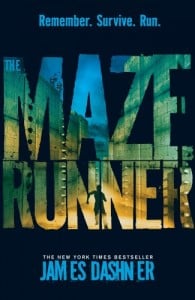I know, I know. Everyone has heard enough about The Hunger Games, Divergent, and The Maze Runner. But, in the spirit of the recent release of the Maze Runner movie and the much-anticipated release of the Mockingjay Part 1 film, I have one final thing to say about this trio of dystopian novels.
I believe that these three stories exemplify the pattern for the common dystopian novel. Many different elements contribute to a popular dystopian piece of fiction. In fact, I think that The Maze Runner contains a mix of ingredients similar to those in Divergent and The Hunger Games, which is what makes it both cliché and refreshing.
The definition of dystopia is a place where people are not happy and are afraid because of the unfair treatment that they receive. Dystopia is also known as the anti-utopia. It can be said for all three stories that their characters are not happy with their lives, and that they live in constant fear of authority figures. In each story, there is a character who thinks differently and leads others into rebellion. These are some of the general signs of a dystopian society.
There are many specific parallels between The Hunger Games and The Maze Runner. Thomas’ maze resembles Katniss’ arena, with the Glade serving the same purpose as that of the Cornucopia, the safe center amidst all the chaos. These environments, although they seem natural, are entirely manmade, and are structured for a similar reason: watching teenagers fight to survive. However, the people of the Capitol in The Hunger Games purely find entertainment in watching the teens in the arena, and the Creators in The Maze Runner watch the Gladers in the maze for observation and experimentation. Next are the Grievers, which could be found in a Hunger Games arena as mutations engineered by the Game-makers because they are a mix of insect and machine, just like the mutt dogs in Katniss’ and Peeta’s first games, and the monkeys in their second. While Katniss, Peeta, and other tributes fight each other to the death, the environment and the mutations are the only things that Thomas and the Gladers have to worry about. There are also similar means that scientists use to follow the teenagers around. In the arena, there are hidden cameras, while beetle-blades scuttle are all over the maze and Glade. The Creators and Game-makers work in the same manner of throwing variables and obstacles at the tributes, and the Gladers challenge them to whittle down the number of survivors.
Many parallels exist between Divergent and The Maze Runner as well. The Maze/Glade and the city of Chicago are merely experiments run by cold and calculating scientists searching for specific results and outcomes. Observation of brain activity plays a key role in the end of both stories. The scientists in Divergent searching for “pure and damaged genes” by classifying thinkers as divergent or single-minded while those in The Maze Runner examine the ability of the boys to find a cure to the “Flare.” Although the scientists seem indifferent, they really are trying to heal their worlds. In my opinion, The Maze Runner scientists more closely resemble the Erudite faction in Divergent than the scientists observing the whole Chicago experiment. Ava Paige fills the same archetype as Jeanine Matthews and Edith Prior.
However, The Maze Runner still manages to break the mold. For example, both Divergent and The Hunger Games have a female heroine as their main character, while Thomas is the male hero of the Maze Runner. Plus, the fact that the Sun has scorched the earth and brought The Flare to humans is quite an original apocalypse.
Of course, this whole triad of dystopian stories contains overlapping features that others lack. But there is definitely a common blueprint for popular dystopian literature. This equation is:
(cruel/corrupt/controlling government) + (rebellious hero/heroine who thinks differently and challenges tradition) + (lover or love triangle) + (challenges/obstacles) + (blood and weapons) + (tragic death)

Great Blog Des! I agree with the concept. Most dystopian novels sometimes feel like they can be in the same universe. I think that would be a cool idea from all of this.
I really like how you came up with an equation, with the elements of dystopian literature. I’ve always been in love with utopia/dystopia, especially when a book takes place in the future of our real world. It makes me think of how our world could possibly change into a utopia/dystopia… Or not.